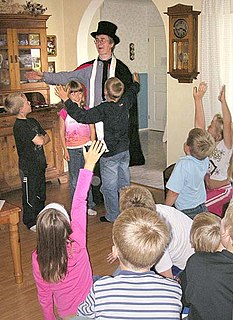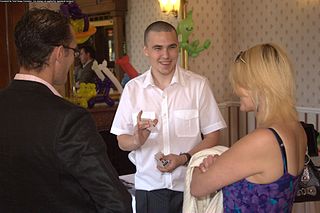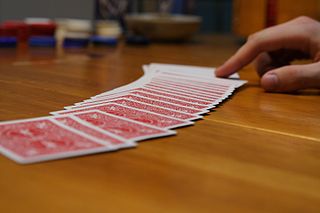 W
WMagic, which encompasses the subgenres of illusion, stage magic, and close up magic, among others, is a performing art in which audiences are entertained by tricks, effects, or illusions of seemingly impossible feats, using natural means. It is to be distinguished from paranormal magic which are effects claimed to be created through supernatural means. It is one of the oldest performing arts in the world.
 W
WThe aerial suspension, ethereal suspension or broomstick illusion is an illusion in which the performer appears to be suspended in mid-air for some minutes, with either inadequate support or no apparent support of his or her weight. This trick was first recorded in India and europe in the early 19th century.
 W
WThe Brotherhood of Auckland Magicians Inc (BAM) is a New Zealand-based non-for-profit organisation and magic club. It was founded in 1946.
 W
WChildren's magic is a specialized aspect of parlor magic and is meant to entertain children. It is typically performed at birthday parties, churches, preschools, elementary schools, Sunday Schools or libraries. It is often the only type of magic most Westerners experience other than that seen on television. This type of magic is usually comedic in nature.
 W
WClose-up magic is magic performed in an intimate setting usually no more than 3 meters from one's audience and is usually performed while sitting at a table.
 W
WCongressional Resolution 642 is a proposed legislation, introduced to the United States House Committee on Oversight and Government Reform by Pete Sessions on 14 March 2016, to help preserve, protect, and promote magic as an art form. The movement is publicly headed by Las Vegas magician David Copperfield and is embodied by various magic organisations, including the Society of American Magicians and the International Brotherhood of Magicians, and by many politicians. The bill demands that the United States House of Representatives:(1) recognizes magic as a rare and valuable art form and national treasure; (2) takes magicians seriously; (3) supports efforts to make certain that magic is preserved, understood, and promulgated
 W
WEscapology is the practice of escaping from restraints or other traps. Escapologists escape from handcuffs, straitjackets, cages, coffins, steel boxes, barrels, bags, burning buildings, fish-tanks, and other perils, often in combination.
 W
WIn stage magic, a force is a method of controlling a choice made by a spectator during a trick. Some forces are performed physically using sleight of hand, such as a trick where a spectator appears to select a random card from a deck but is instead handed a known card by the magician. Other forces use equivocation to create the illusion of a free decision in a situation where all choices lead to the same outcome.
 W
WA gibeciere is a large pouch-like device used by magicians as a utility device, most often to aid in the performance of the famous magic trick known as "The Cups and Balls". In modern times, it is often used by street magicians due to its ability to hold large items such as fruits, various balls and sometimes stuffed or even real animals. It is commonly held around the performer's waist by a belt, in plain sight, and the pouch commonly rests along the front of the body, just below the waistline.
 W
WMagic, which encompasses the subgenres of illusion, stage magic, and close up magic, among others, is a performing art in which audiences are entertained by tricks, effects, or illusions of seemingly impossible feats, using natural means. It is to be distinguished from paranormal magic which are effects claimed to be created through supernatural means. It is one of the oldest performing arts in the world.
 W
WMagic, which encompasses the subgenres of illusion, stage magic, and close up magic, among others, is a performing art in which audiences are entertained by tricks, effects, or illusions of seemingly impossible feats, using natural means. It is to be distinguished from paranormal magic which are effects claimed to be created through supernatural means. It is one of the oldest performing arts in the world.
 W
WInvisible thread is very thin monofilament thread used by magicians to make small, lightweight objects seem to levitate and animate. It is usually made from nylon which has been separated into individual strands. A famous illusion is the Floating Bill.
 W
WA magic store is an establishment which sells materials for performing magic tricks. Magic shops often also sell practical jokes and novelty items, and frequently serve as informal gathering places for amateur magicians, with some hosting organized magic clubs.
 W
WMechanical magic constitutes a class of illusion magic which is performed for an audience, often in a theater or upon a stage. In this form of magic, the magician appears to perform a series of seemingly impossible feats aided by various hidden mechanical devices which are operated without the audience detecting their action. It was popular during the late 19th and early 20th centuries.
 W
WMentalism is a performing art in which its practitioners, known as mentalists, appear to demonstrate highly developed mental or intuitive abilities. Performances may appear to include hypnosis, telepathy, clairvoyance, divination, precognition, psychokinesis, mediumship, mind control, memory feats, deduction, and rapid mathematics. Mentalists perform a theatrical act that includes effects that may appear to employ psychic or supernatural forces but that are actually achieved by "ordinary conjuring means," natural human abilities, and an in-depth understanding of key principles from human psychology or other behavioral sciences.
 W
WStreet magic falls into two genres; traditional street performance and guerrilla magic.
 W
WStreet performance or busking is the act of performing in public places for gratuities. In many countries, the rewards are generally in the form of money but other gratuities such as food, drink or gifts may be given. Street performance is practiced all over the world and dates back to antiquity. People engaging in this practice are called street performers or buskers in the United Kingdom. Buskers is not a term generally used in American English.